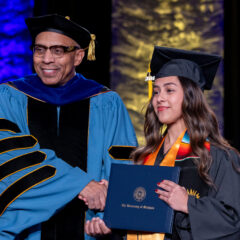Learn more about studying smart manufacturing and automation at UM-Flint
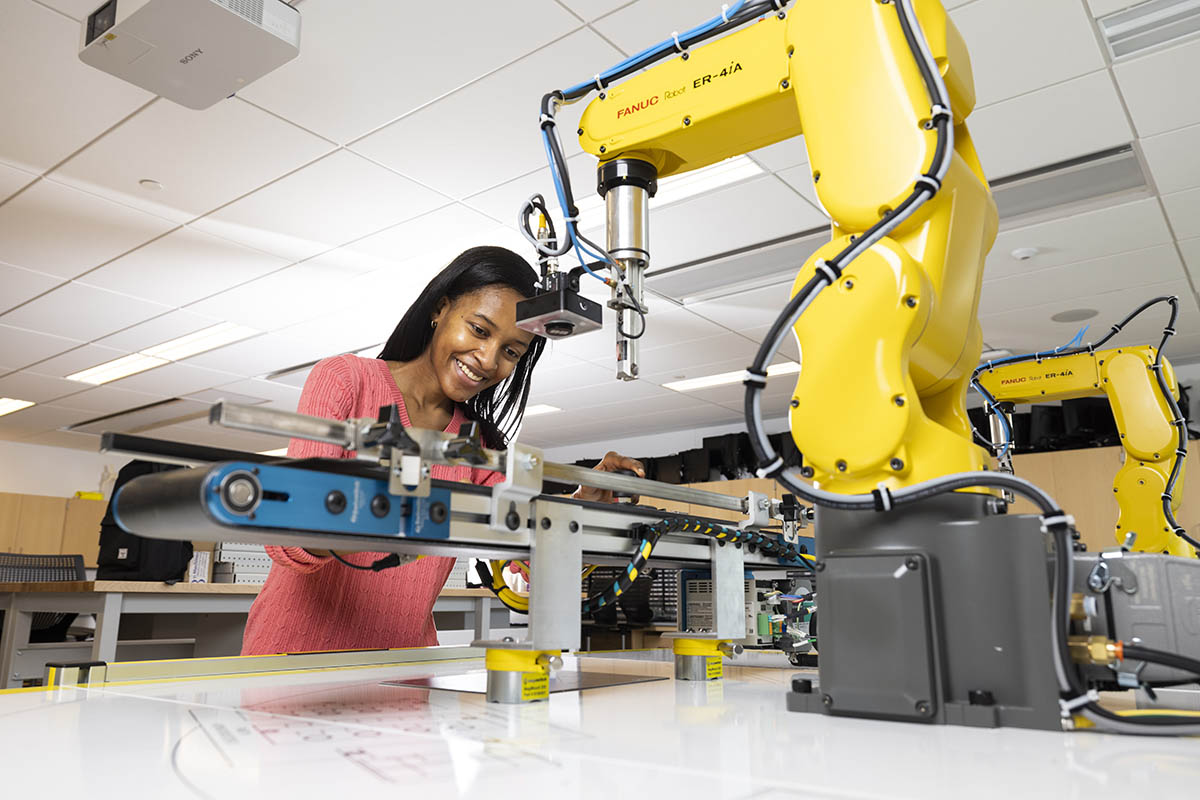
A passion for computing and technology doesn't have to mean working in Silicon Valley or coding in a coffee shop. In an increasingly data-driven world, technological competencies could make job-seekers an asset in nearly every sector of manufacturing and industry. Imagine using artificial intelligence to scan for faulty welds in critical equipment, increasing safety and profits at the same time. Predictive maintenance software could indicate when assembly machines will break before they fail, increasing efficiency and lowering costs. An analytical review of a company's shipping logistics could reveal bottlenecks and waste, creating opportunities to streamline processes and reduce emissions.
The University of Michigan-Flint's smart manufacturing and automation program equips students to enter the workforce through hands-on learning, expert faculty dedicated to student success and world-class laboratories and equipment. Offered by UM-Flint's College of Innovation & Technology, students learn alongside motivated peers who share their curiosity and drive to make the world a better, smarter, more connected place.
What is Smart Manufacturing and Automation?
Smart manufacturing and automation encompass a broad range of innovative technologies and practices designed to make factories more efficient and flexible. Key components include Internet of Things connectivity, data analytics, AI-driven decision-making and robotics, all of which work together to collect, analyze and act on real-time data. This integration enables factories to identify inefficiencies, predict maintenance needs and adapt quickly to market changes.
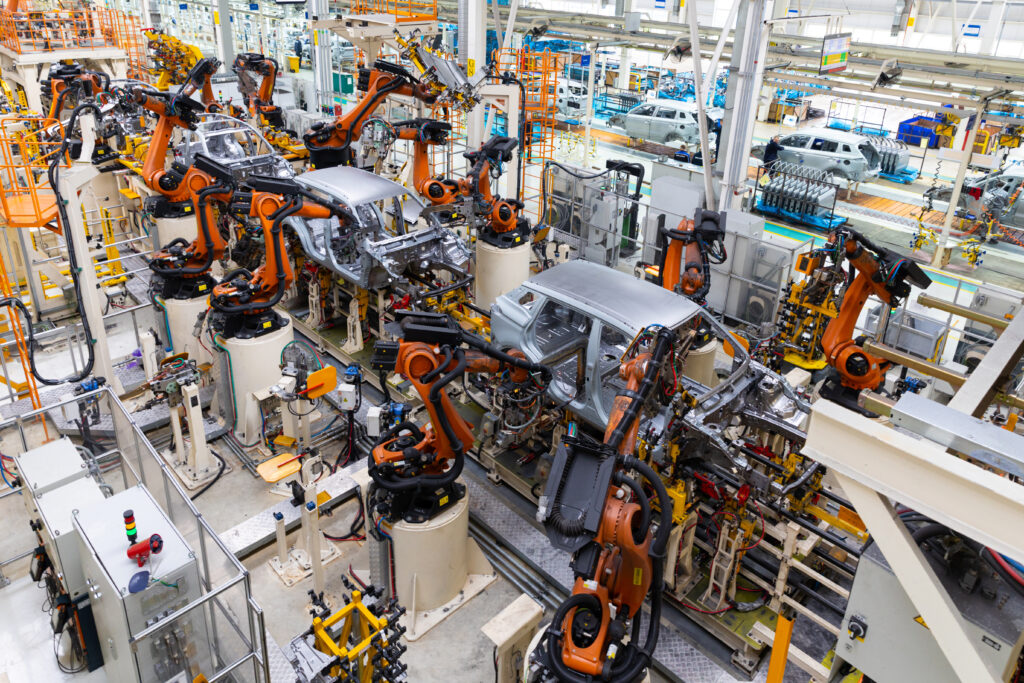
For example, AI algorithms can analyze production data to optimize workflows, while robots can be programmed to handle complex tasks, ensuring consistent product quality and faster production times. These advanced capabilities lead to a host of benefits, including enhanced productivity, reduced waste and improved sustainability. As industries aim to be more environmentally friendly and resource-efficient, smart manufacturing and automation offer the tools and strategies necessary to achieve these goals.
In-Demand Smart Manufacturing Careers
The shift towards smart manufacturing and automation has opened up a large number of career opportunities for educated, driven professionals. Industries across the globe are investing heavily in these technologies to stay competitive, creating a robust job market for those with the right preparation. Five in-demand career paths in this field are:
- AI Systems Development
- Automation Engineering
- Robotics Maintenance
- Manufacturing Data Analysis
- Industrial Engineering
According to the U.S. Bureau of Labor Statistics, industrial engineering – designing, developing and testing integrated systems for managing industrial production processes – is projected to grow 12% through 2033, much faster than the national average. It's an even brighter outlook for logisticians, who analyze and coordinate an organization's supply chain. That field has a 19% growth outlook, among the fastest-growing in the nation.
Why Choose UM-Flint for Smart Manufacturing and Automation?
The experiences students gain while earning a degree can make the difference when marketing themselves to potential employers. UM-Flint collaborates with industry leaders to ensure our curriculum gives students what they need to meet workforce demand.
Hands-on Learning
The smart manufacturing and automation program works closely with an advisory panel of leading professionals to create cocurricular opportunities for students to obtain first-hand experience in applying the latest manufacturing technologies to the real world. CIT industry partners include Consumers Energy, Ford Motor Company, General Motors, Lear Corporation, Verizon Wireless and more.
Committed Expert Faculty

CIT faculty members are experts in their fields, allowing students to develop inspiring mentorships with instructors and gain valuable academic and career guidance. Shirl Donaldson, assistant professor of engineering, worked in machine shops that were tier one suppliers to the automotive industry before taking her talents to academia. She often helps students apply their classroom learning to real-world projects. In one example, Donaldson worked with students and fellow faculty from CIT and UM-Flint's occupational therapy doctorate program to design and build an adaptive Power Wheels car for a local boy who lost his legs following an illness.
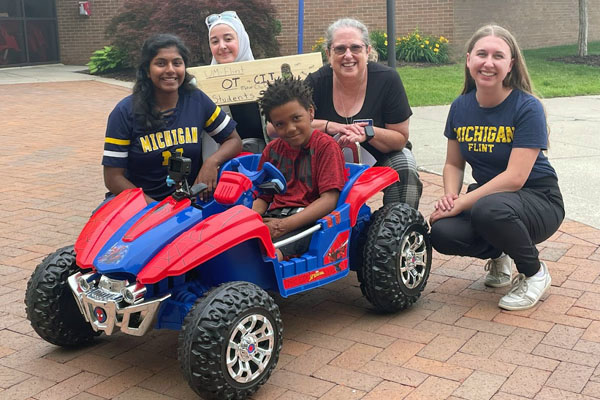
"Our students want to see the impact they make in the world," Donaldson said. "We are living our mission. What our students are learning can really make a difference in people's lives. We can share talent and resources and impact the community."
Thiago Ferreira, assistant professor of information technology informatics, was also involved in the project.
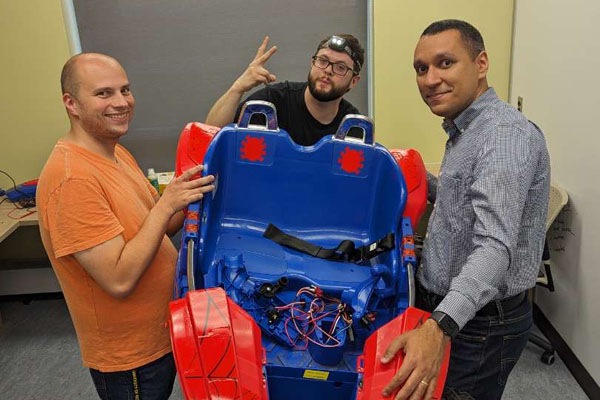
"Ours is a culture of proposing real solutions for real-world problems," Ferreira said. "This project taught so many important skills, including communication and teamwork. If you don't know how to ask the right question, you can't solve a problem. Students also learned how to manage time, costs and resources."
Undergraduate and Graduate Options
With both bachelor's and master's degree offerings, students can take advantage of the unique opportunities UM-Flint offers no matter where they are in their educational journey.
In line with the program's commitment to real-world application, bachelor's degree students complete their studies with a capstone course that pushes them to "design and implement an entrepreneurial and innovative solution to an industry-based problem." Opportunities to earn credits for completing an internship or completing an independent study also exist.
The master's program offers four concentrations: AI, Digital Twin, and Augmented Reality/Virtual Reality in Manufacturing; Industrial Internet of Things and Cybersecurity for Smart Manufacturing; Digitalization of Manufacturing Systems; and Collaborative Robots in Manufacturing.
Is a Career in Smart Manufacturing the Right Choice?
If students are enthusiastic about technology and envision themselves at the forefront of transforming industrial processes, a career in smart manufacturing and automation might be the perfect fit for them. As professionals in this field, they'll draw from their training in computer science, engineering, and data analytics to develop and optimize business practices.
This career path requires strong analytical and problem-solving skills, as well as creativity in developing innovative solutions to complex manufacturing challenges. Being comfortable with emerging technologies and adaptable to new learning environments is also crucial in this rapidly evolving industry.
Join the Revolution in Manufacturing and Technology
Ready to be a part of this innovative transformation in manufacturing? Take the next step by applying today:
Logan McGrady
Logan McGrady is the marketing & digital communication manager for the Office of Marketing and Communication.
